Hey everyone, I was doing some research on macroalgae and was wondering if it would be feasible to have it in a tank with lps or even sps? I'm not too knowledgable on either of them, but I know macro is used in the fuges of sps tanks sometimes (chaetomorpha) and I was wondering if it would be possible to have a macro/sps tank? Like 2 different mini-environments in one tank?
Navigation
Install the app
How to install the app on iOS
Follow along with the video below to see how to install our site as a web app on your home screen.
Note: This feature may not be available in some browsers.
More options
You are using an out of date browser. It may not display this or other websites correctly.
You should upgrade or use an alternative browser.
You should upgrade or use an alternative browser.
can macroalgae and sps co-exist?
- Thread starter andiesreef
- Start date
- Tagged users None
I’ve kept macro with sps (not acros lol) , macros don’t really require more maintenance than any sps , if anything you will be having to dose more (neophos , neonitrate , iodine , iron, calcium , potassium - for macros )Hey everyone, I was doing some research on macroalgae and was wondering if it would be feasible to have it in a tank with lps or even sps? I'm not too knowledgable on either of them, but I know macro is used in the fuges of sps tanks sometimes (chaetomorpha) and I was wondering if it would be possible to have a macro/sps tank? Like 2 different mini-environments in one tank?
If you're careful. The DOC macro algae dump into the water can promote pathogenic shifts in coral microbiomes. Cryptic sponges may save them by removing labile DOC really fast (much faster than bacterioplankton). Some coral species and genotypes have much more robust immune systems than others and will be more resistant to shifts in their microbiome. Forest ROhwer's "Coral Reefs in the Microbial Seas is an excellent introduction to the various roles of DOC on reefs. Jasper de Goeij's thesis on sponges is fascinating also. If you're interested here's some links:
Wright, R.M., Kenkel, C.D., Dunn, C.E. et al. Intraspecific differences in molecular stress responses and coral pathobiome contribute to mortality under bacterial challenge in Acropora millepora . Sci Rep 7, 2609 (2017). https://doi.org/10.1038/s41598-017-02685-1
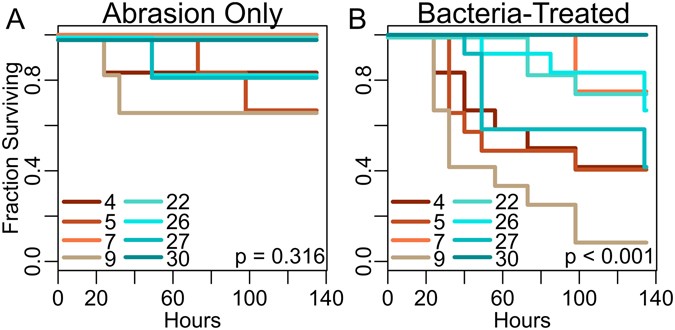
 www.nature.com
www.nature.com
Indirect effects of algae on coral: algae‐mediated, microbe‐induced coral mortality
Coral seperated from algae with a .02 µm filter die. Treatment with aampicillan prevents death.
 onlinelibrary.wiley.com
onlinelibrary.wiley.com
Influence of coral and algal exudates on microbially mediated reef metabolism.
Coral DOC improves oxygen (autotrophy), algae DOC reduces oxygen (heterotrophy).
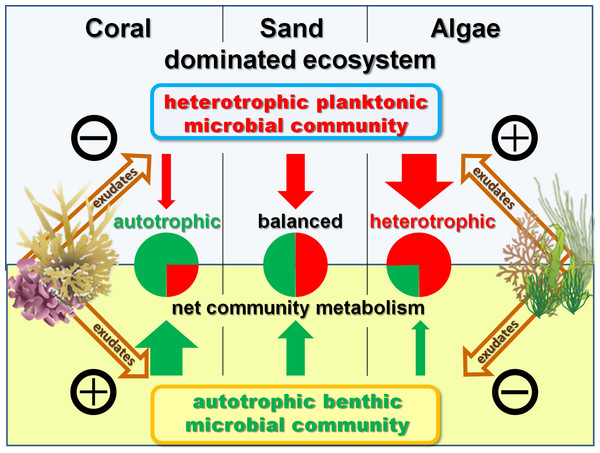
 peerj.com
peerj.com
Role of elevated organic carbon levels and microbial activity in coral mortality
Effects of Coral Reef Benthic Primary Producers on Dissolved Organic Carbon and Microbial Activity
Algae releases significantly more DOC into the water than coral.
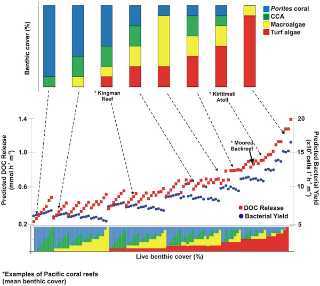
 journals.plos.org
journals.plos.org
Pathologies and mortality rates caused by organic carbon and nutrient stressors in three Caribbean coral species.
Starch and sugars (doc) caused coral death but not high nitrates, phosphates or ammonium.
Visualization of oxygen distribution patterns caused by coral and algae
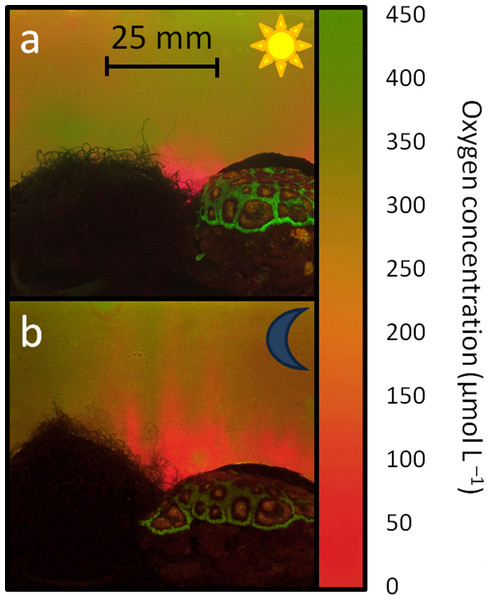
 peerj.com
peerj.com
Biological oxygen demand optode analysis of coral reef-associated microbial communities exposed to algal exudates
Exposure to exudates derived from turf algae stimulated higher oxygen drawdown by the coral-associated bacteria.

 www.ncbi.nlm.nih.gov
www.ncbi.nlm.nih.gov
Microbial ecology: Algae feed a shift on coral reefs
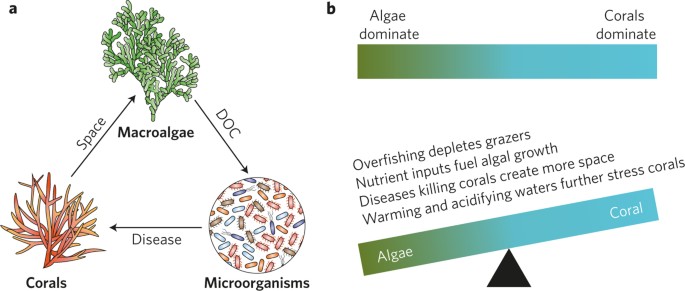
 www.nature.com
www.nature.com
Coral and macroalgal exudates vary in neutral sugar composition and differentially enrich reef bacterioplankton lineages.

 www.ncbi.nlm.nih.gov
www.ncbi.nlm.nih.gov
Sugar enrichment provides evidence for a role of nitrogen fixation in coral bleaching
 onlinelibrary.wiley.com
onlinelibrary.wiley.com
Elevated ammonium delays the impairment of the coral-dinoflagellate symbiosis during labile carbon pollution
(here's an argument for maintaining heavy fish loads if you're carbon dosing)
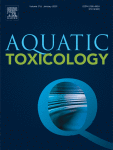
 www.sciencedirect.com
www.sciencedirect.com
Excess labile carbon promotes the expression of virulence factors in coral reef bacterioplankton
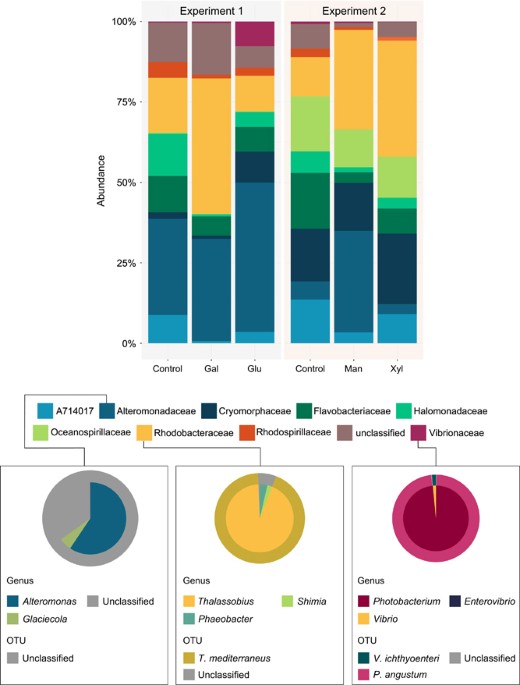
 www.nature.com
www.nature.com
Unseen players shape benthic competition on coral reefs.

 www.ncbi.nlm.nih.gov
www.ncbi.nlm.nih.gov
Allelochemicals Produced by Brown Macroalgae of the Lobophora Genus Are Active against Coral Larvae and Associated Bacteria, Supporting Pathogenic Shifts to Vibrio Dominance.

 www.ncbi.nlm.nih.gov
www.ncbi.nlm.nih.gov
Macroalgae decrease growth and alter microbial community structure of the reef-building coral, Porites astreoides.

 www.ncbi.nlm.nih.gov
www.ncbi.nlm.nih.gov
Macroalgal extracts induce bacterial assemblage shifts and sublethal tissue stress in Caribbean corals.

 www.ncbi.nlm.nih.gov
www.ncbi.nlm.nih.gov
Biophysical and physiological processes causing oxygen loss from coral reefs.
Global microbialization of coral reefs
DDAM Proven
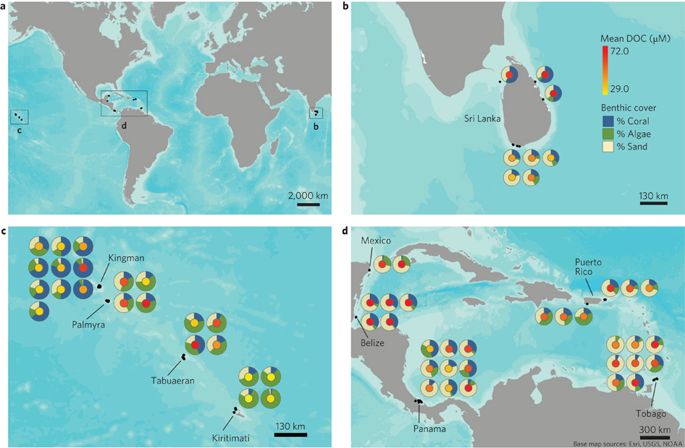
 www.nature.com
www.nature.com
Coral Reef Microorganisms in a Changing Climate, Fig 3

 www.ncbi.nlm.nih.gov
www.ncbi.nlm.nih.gov
Ecosystem Microbiology of Coral Reefs: Linking Genomic, Metabolomic, and Biogeochemical Dynamics from Animal Symbioses to Reefscape Processes
Differential recycling of coral and algal dissolved organic matter via the sponge loop.
Sponges treat DOC from algae differently than DOC from corals
 besjournals.onlinelibrary.wiley.com
besjournals.onlinelibrary.wiley.com
Surviving in a Marine Desert The Sponge Loop Retains Resources Within Coral Reefs
Dissolved organic carbon and nitrogen are quickly processed by sponges and released back into the reef food web in hours as carbon and nitrogen rich detritus.
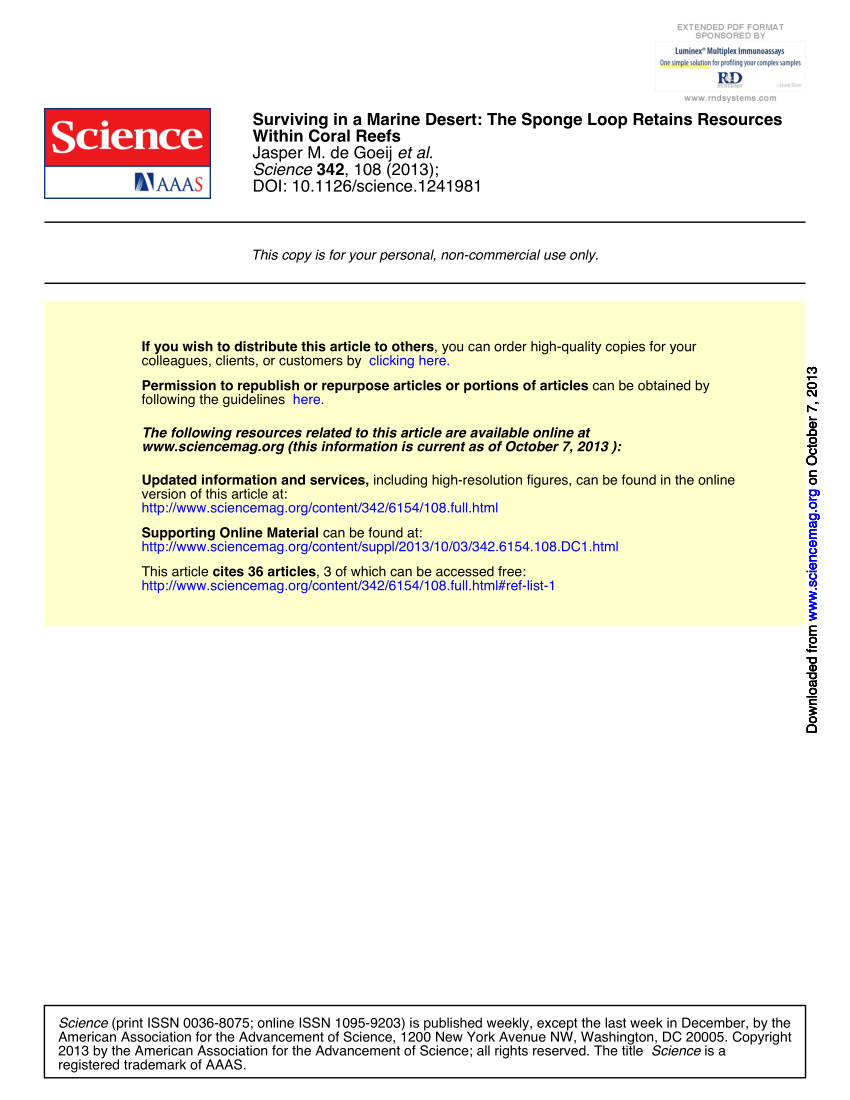
 www.researchgate.net
www.researchgate.net
Natural Diet of Coral-Excavating Sponges Consists Mainly of Dissolved Organic Carbon (DOC)

 www.ncbi.nlm.nih.gov
www.ncbi.nlm.nih.gov
The Role of Marine Sponges in Carbon and Nitrogen Cycles of COral Reefs and Nearshore Environments.
 search.proquest.com
search.proquest.com
And since we're discussing favorable and not so favorable bacteria here's a paper looking at how different corals and polyps are influencing the bacteria in the water column.
Aura-biomes are present in the water layer above coral reef benthic macro-organisms

 www.ncbi.nlm.nih.gov
www.ncbi.nlm.nih.gov
Wright, R.M., Kenkel, C.D., Dunn, C.E. et al. Intraspecific differences in molecular stress responses and coral pathobiome contribute to mortality under bacterial challenge in Acropora millepora . Sci Rep 7, 2609 (2017). https://doi.org/10.1038/s41598-017-02685-1

Intraspecific differences in molecular stress responses and coral pathobiome contribute to mortality under bacterial challenge in Acropora millepora - Scientific Reports
Disease causes significant coral mortality worldwide; however, factors responsible for intraspecific variation in disease resistance remain unclear. We exposed fragments of eight Acropora millepora colonies (genotypes) to putatively pathogenic bacteria (Vibrio spp.). Genotypes varied from zero...
Indirect effects of algae on coral: algae‐mediated, microbe‐induced coral mortality
Coral seperated from algae with a .02 µm filter die. Treatment with aampicillan prevents death.
Error - Cookies Turned Off
Influence of coral and algal exudates on microbially mediated reef metabolism.
Coral DOC improves oxygen (autotrophy), algae DOC reduces oxygen (heterotrophy).

Influence of coral and algal exudates on microbially mediated reef metabolism
Benthic primary producers in tropical reef ecosystems can alter biogeochemical cycling and microbial processes in the surrounding seawater. In order to quantify these influences, we measured rates of photosynthesis, respiration, and dissolved organic carbon (DOC) exudate release by the dominant...
Role of elevated organic carbon levels and microbial activity in coral mortality
Effects of Coral Reef Benthic Primary Producers on Dissolved Organic Carbon and Microbial Activity
Algae releases significantly more DOC into the water than coral.
Effects of Coral Reef Benthic Primary Producers on Dissolved Organic Carbon and Microbial Activity
Benthic primary producers in marine ecosystems may significantly alter biogeochemical cycling and microbial processes in their surrounding environment. To examine these interactions, we studied dissolved organic matter release by dominant benthic taxa and subsequent microbial remineralization in...
Pathologies and mortality rates caused by organic carbon and nutrient stressors in three Caribbean coral species.
Starch and sugars (doc) caused coral death but not high nitrates, phosphates or ammonium.
Visualization of oxygen distribution patterns caused by coral and algae

Visualization of oxygen distribution patterns caused by coral and algae
Planar optodes were used to visualize oxygen distribution patterns associated with a coral reef associated green algae (Chaetomorpha sp.) and a hermatypic coral (Favia sp.) separately, as standalone organisms, and placed in close proximity mimicking coral-algal interactions. Oxygen patterns were...
Biological oxygen demand optode analysis of coral reef-associated microbial communities exposed to algal exudates
Exposure to exudates derived from turf algae stimulated higher oxygen drawdown by the coral-associated bacteria.

Biological oxygen demand optode analysis of coral reef-associated microbial communities exposed to algal exudates
Algae-derived dissolved organic matter has been hypothesized to induce mortality of reef building corals. One proposed killing mechanism is a zone of hypoxia created by rapidly growing microbes. To investigate this hypothesis, biological oxygen demand ...
Microbial ecology: Algae feed a shift on coral reefs

Microbial ecology: Algae feed a shift on coral reefs - Nature Microbiology
Human pressures on coral reefs are giving macroalgae a competitive advantage over reef-building corals. These algae support larger, and potentially pathogenic, microbial populations that are metabolically primed for less-efficient, yet faster, carbohydrate remineralization, perpetuating a...
Coral and macroalgal exudates vary in neutral sugar composition and differentially enrich reef bacterioplankton lineages.

Coral and macroalgal exudates vary in neutral sugar composition and differentially enrich reef bacterioplankton lineages - PubMed
Increasing algal cover on tropical reefs worldwide may be maintained through feedbacks whereby algae outcompete coral by altering microbial activity. We hypothesized that algae and coral release compositionally distinct exudates that differentially alter bacterioplankton growth and community...
Sugar enrichment provides evidence for a role of nitrogen fixation in coral bleaching
Error - Cookies Turned Off
Elevated ammonium delays the impairment of the coral-dinoflagellate symbiosis during labile carbon pollution
(here's an argument for maintaining heavy fish loads if you're carbon dosing)

Elevated ammonium delays the impairment of the coral-dinoflagellate symbiosis during labile carbon pollution
Labile dissolved organic carbon (DOC) is a major pollutant in coastal marine environments affected by anthropogenic impacts, and may significantly con…
Excess labile carbon promotes the expression of virulence factors in coral reef bacterioplankton

Excess labile carbon promotes the expression of virulence factors in coral reef bacterioplankton - The ISME Journal
Coastal pollution and algal cover are increasing on many coral reefs, resulting in higher dissolved organic carbon (DOC) concentrations. High DOC concentrations strongly affect microbial activity in reef waters and select for copiotrophic, often potentially virulent microbial populations. High...
Unseen players shape benthic competition on coral reefs.

Unseen players shape benthic competition on coral reefs - PubMed
Recent work has shown that hydrophilic and hydrophobic organic matter (OM) from algae disrupts the function of the coral holobiont and promotes the invasion of opportunistic pathogens, leading to coral morbidity and mortality. Here we refer to these dynamics as the (3)DAM [dissolved organic...
Allelochemicals Produced by Brown Macroalgae of the Lobophora Genus Are Active against Coral Larvae and Associated Bacteria, Supporting Pathogenic Shifts to Vibrio Dominance.

Allelochemicals Produced by Brown Macroalgae of the Lobophora Genus Are Active against Coral Larvae and Associated Bacteria, Supporting Pathogenic Shifts to Vibrio Dominance - PubMed
Diverse microbial communities associate with coral tissues and mucus, providing important protective and nutritional services, but once disturbed, the microbial equilibrium may shift from a beneficial state to one that is detrimental or pathogenic. Macroalgae (e.g., seaweeds) can physically and...
Macroalgae decrease growth and alter microbial community structure of the reef-building coral, Porites astreoides.

Macroalgae decrease growth and alter microbial community structure of the reef-building coral, Porites astreoides - PubMed
With the continued and unprecedented decline of coral reefs worldwide, evaluating the factors that contribute to coral demise is of critical importance. As coral cover declines, macroalgae are becoming more common on tropical reefs. Interactions between these macroalgae and corals may alter the...
Macroalgal extracts induce bacterial assemblage shifts and sublethal tissue stress in Caribbean corals.

Macroalgal extracts induce bacterial assemblage shifts and sublethal tissue stress in Caribbean corals - PubMed
Benthic macroalgae can be abundant on present-day coral reefs, especially where rates of herbivory are low and/or dissolved nutrients are high. This study investigated the impact of macroalgal extracts on both coral-associated bacterial assemblages and sublethal stress response of corals. Crude...
Biophysical and physiological processes causing oxygen loss from coral reefs.
Global microbialization of coral reefs
DDAM Proven

Global microbialization of coral reefs - Nature Microbiology
Analysis of 60 sites in three ocean basins suggests that overgrowth of fleshy algae on coral reefs supports higher microbial abundances dominated by copiotrophic, potentially pathogenic bacteria via the provision of dissolved inorganic carbon.
Coral Reef Microorganisms in a Changing Climate, Fig 3

Coral Reef Microorganisms in a Changing Climate
Coral reefs are one of the most diverse and productive ecosystems on the planet, yet they have suffered tremendous losses due to anthropogenic disturbances and are predicted to be one of the most adversely affected habitats under future climate change ...
Ecosystem Microbiology of Coral Reefs: Linking Genomic, Metabolomic, and Biogeochemical Dynamics from Animal Symbioses to Reefscape Processes
Differential recycling of coral and algal dissolved organic matter via the sponge loop.
Sponges treat DOC from algae differently than DOC from corals
Error - Cookies Turned Off
Surviving in a Marine Desert The Sponge Loop Retains Resources Within Coral Reefs
Dissolved organic carbon and nitrogen are quickly processed by sponges and released back into the reef food web in hours as carbon and nitrogen rich detritus.

(PDF) 2013 deGoeij Science Sponge loop
PDF | On Jun 23, 2015, Jasper M de Goeij and others published 2013 deGoeij Science Sponge loop | Find, read and cite all the research you need on ResearchGate
Natural Diet of Coral-Excavating Sponges Consists Mainly of Dissolved Organic Carbon (DOC)

Natural Diet of Coral-Excavating Sponges Consists Mainly of Dissolved Organic Carbon (DOC)
Coral-excavating sponges are the most important bioeroders on Caribbean reefs and increase in abundance throughout the region. This increase is commonly attributed to a concomitant increase in food availability due to eutrophication and pollution. We ...
The Role of Marine Sponges in Carbon and Nitrogen Cycles of COral Reefs and Nearshore Environments.
The role of marine sponges in carbon and nitrogen cycles of coral reef and nearshore environments - ProQuest
Explore millions of resources from scholarly journals, books, newspapers, videos and more, on the ProQuest Platform.
And since we're discussing favorable and not so favorable bacteria here's a paper looking at how different corals and polyps are influencing the bacteria in the water column.
Aura-biomes are present in the water layer above coral reef benthic macro-organisms

Aura-biomes are present in the water layer above coral reef benthic macro-organisms - PubMed
As coral reef habitats decline worldwide, some reefs are transitioning from coral- to algal-dominated benthos with the exact cause for this shift remaining elusive. Increases in the abundance of microbes in the water column has been correlated with an increase in coral disease and reduction in...
This is an incredibly informative answer... well done @TimfishIf you're careful. The DOC macro algae dump into the water can promote pathogenic shifts in coral microbiomes. Cryptic sponges may save them by removing labile DOC really fast (much faster than bacterioplankton). Some coral species and genotypes have much more robust immune systems than others and will be more resistant to shifts in their microbiome. Forest ROhwer's "Coral Reefs in the Microbial Seas is an excellent introduction to the various roles of DOC on reefs. Jasper de Goeij's thesis on sponges is fascinating also. If you're interested here's some links:
Wright, R.M., Kenkel, C.D., Dunn, C.E. et al. Intraspecific differences in molecular stress responses and coral pathobiome contribute to mortality under bacterial challenge in Acropora millepora . Sci Rep 7, 2609 (2017). https://doi.org/10.1038/s41598-017-02685-1

Intraspecific differences in molecular stress responses and coral pathobiome contribute to mortality under bacterial challenge in Acropora millepora - Scientific Reports
Disease causes significant coral mortality worldwide; however, factors responsible for intraspecific variation in disease resistance remain unclear. We exposed fragments of eight Acropora millepora colonies (genotypes) to putatively pathogenic bacteria (Vibrio spp.). Genotypes varied from zero...www.nature.com
Indirect effects of algae on coral: algae‐mediated, microbe‐induced coral mortality
Coral seperated from algae with a .02 µm filter die. Treatment with aampicillan prevents death.
Error - Cookies Turned Off
onlinelibrary.wiley.com
Influence of coral and algal exudates on microbially mediated reef metabolism.
Coral DOC improves oxygen (autotrophy), algae DOC reduces oxygen (heterotrophy).

Influence of coral and algal exudates on microbially mediated reef metabolism
Benthic primary producers in tropical reef ecosystems can alter biogeochemical cycling and microbial processes in the surrounding seawater. In order to quantify these influences, we measured rates of photosynthesis, respiration, and dissolved organic carbon (DOC) exudate release by the dominant...peerj.com
Role of elevated organic carbon levels and microbial activity in coral mortality
Effects of Coral Reef Benthic Primary Producers on Dissolved Organic Carbon and Microbial Activity
Algae releases significantly more DOC into the water than coral.

Effects of Coral Reef Benthic Primary Producers on Dissolved Organic Carbon and Microbial Activity
Benthic primary producers in marine ecosystems may significantly alter biogeochemical cycling and microbial processes in their surrounding environment. To examine these interactions, we studied dissolved organic matter release by dominant benthic taxa and subsequent microbial remineralization in...journals.plos.org
Pathologies and mortality rates caused by organic carbon and nutrient stressors in three Caribbean coral species.
Starch and sugars (doc) caused coral death but not high nitrates, phosphates or ammonium.
Visualization of oxygen distribution patterns caused by coral and algae

Visualization of oxygen distribution patterns caused by coral and algae
Planar optodes were used to visualize oxygen distribution patterns associated with a coral reef associated green algae (Chaetomorpha sp.) and a hermatypic coral (Favia sp.) separately, as standalone organisms, and placed in close proximity mimicking coral-algal interactions. Oxygen patterns were...peerj.com
Biological oxygen demand optode analysis of coral reef-associated microbial communities exposed to algal exudates
Exposure to exudates derived from turf algae stimulated higher oxygen drawdown by the coral-associated bacteria.

Biological oxygen demand optode analysis of coral reef-associated microbial communities exposed to algal exudates
Algae-derived dissolved organic matter has been hypothesized to induce mortality of reef building corals. One proposed killing mechanism is a zone of hypoxia created by rapidly growing microbes. To investigate this hypothesis, biological oxygen demand ...www.ncbi.nlm.nih.gov
Microbial ecology: Algae feed a shift on coral reefs

Microbial ecology: Algae feed a shift on coral reefs - Nature Microbiology
Human pressures on coral reefs are giving macroalgae a competitive advantage over reef-building corals. These algae support larger, and potentially pathogenic, microbial populations that are metabolically primed for less-efficient, yet faster, carbohydrate remineralization, perpetuating a...www.nature.com
Coral and macroalgal exudates vary in neutral sugar composition and differentially enrich reef bacterioplankton lineages.

Coral and macroalgal exudates vary in neutral sugar composition and differentially enrich reef bacterioplankton lineages - PubMed
Increasing algal cover on tropical reefs worldwide may be maintained through feedbacks whereby algae outcompete coral by altering microbial activity. We hypothesized that algae and coral release compositionally distinct exudates that differentially alter bacterioplankton growth and community...www.ncbi.nlm.nih.gov
Sugar enrichment provides evidence for a role of nitrogen fixation in coral bleaching
Error - Cookies Turned Off
onlinelibrary.wiley.com
Elevated ammonium delays the impairment of the coral-dinoflagellate symbiosis during labile carbon pollution
(here's an argument for maintaining heavy fish loads if you're carbon dosing)

Elevated ammonium delays the impairment of the coral-dinoflagellate symbiosis during labile carbon pollution
Labile dissolved organic carbon (DOC) is a major pollutant in coastal marine environments affected by anthropogenic impacts, and may significantly con…www.sciencedirect.com
Excess labile carbon promotes the expression of virulence factors in coral reef bacterioplankton

Excess labile carbon promotes the expression of virulence factors in coral reef bacterioplankton - The ISME Journal
Coastal pollution and algal cover are increasing on many coral reefs, resulting in higher dissolved organic carbon (DOC) concentrations. High DOC concentrations strongly affect microbial activity in reef waters and select for copiotrophic, often potentially virulent microbial populations. High...www.nature.com
Unseen players shape benthic competition on coral reefs.

Unseen players shape benthic competition on coral reefs - PubMed
Recent work has shown that hydrophilic and hydrophobic organic matter (OM) from algae disrupts the function of the coral holobiont and promotes the invasion of opportunistic pathogens, leading to coral morbidity and mortality. Here we refer to these dynamics as the (3)DAM [dissolved organic...www.ncbi.nlm.nih.gov
Allelochemicals Produced by Brown Macroalgae of the Lobophora Genus Are Active against Coral Larvae and Associated Bacteria, Supporting Pathogenic Shifts to Vibrio Dominance.

Allelochemicals Produced by Brown Macroalgae of the Lobophora Genus Are Active against Coral Larvae and Associated Bacteria, Supporting Pathogenic Shifts to Vibrio Dominance - PubMed
Diverse microbial communities associate with coral tissues and mucus, providing important protective and nutritional services, but once disturbed, the microbial equilibrium may shift from a beneficial state to one that is detrimental or pathogenic. Macroalgae (e.g., seaweeds) can physically and...www.ncbi.nlm.nih.gov
Macroalgae decrease growth and alter microbial community structure of the reef-building coral, Porites astreoides.

Macroalgae decrease growth and alter microbial community structure of the reef-building coral, Porites astreoides - PubMed
With the continued and unprecedented decline of coral reefs worldwide, evaluating the factors that contribute to coral demise is of critical importance. As coral cover declines, macroalgae are becoming more common on tropical reefs. Interactions between these macroalgae and corals may alter the...www.ncbi.nlm.nih.gov
Macroalgal extracts induce bacterial assemblage shifts and sublethal tissue stress in Caribbean corals.

Macroalgal extracts induce bacterial assemblage shifts and sublethal tissue stress in Caribbean corals - PubMed
Benthic macroalgae can be abundant on present-day coral reefs, especially where rates of herbivory are low and/or dissolved nutrients are high. This study investigated the impact of macroalgal extracts on both coral-associated bacterial assemblages and sublethal stress response of corals. Crude...www.ncbi.nlm.nih.gov
Biophysical and physiological processes causing oxygen loss from coral reefs.
Global microbialization of coral reefs
DDAM Proven

Global microbialization of coral reefs - Nature Microbiology
Analysis of 60 sites in three ocean basins suggests that overgrowth of fleshy algae on coral reefs supports higher microbial abundances dominated by copiotrophic, potentially pathogenic bacteria via the provision of dissolved inorganic carbon.www.nature.com
Coral Reef Microorganisms in a Changing Climate, Fig 3

Coral Reef Microorganisms in a Changing Climate
Coral reefs are one of the most diverse and productive ecosystems on the planet, yet they have suffered tremendous losses due to anthropogenic disturbances and are predicted to be one of the most adversely affected habitats under future climate change ...www.ncbi.nlm.nih.gov
Ecosystem Microbiology of Coral Reefs: Linking Genomic, Metabolomic, and Biogeochemical Dynamics from Animal Symbioses to Reefscape Processes
Differential recycling of coral and algal dissolved organic matter via the sponge loop.
Sponges treat DOC from algae differently than DOC from corals
Error - Cookies Turned Off
besjournals.onlinelibrary.wiley.com
Surviving in a Marine Desert The Sponge Loop Retains Resources Within Coral Reefs
Dissolved organic carbon and nitrogen are quickly processed by sponges and released back into the reef food web in hours as carbon and nitrogen rich detritus.

(PDF) 2013 deGoeij Science Sponge loop
PDF | On Jun 23, 2015, Jasper M de Goeij and others published 2013 deGoeij Science Sponge loop | Find, read and cite all the research you need on ResearchGatewww.researchgate.net
Natural Diet of Coral-Excavating Sponges Consists Mainly of Dissolved Organic Carbon (DOC)

Natural Diet of Coral-Excavating Sponges Consists Mainly of Dissolved Organic Carbon (DOC)
Coral-excavating sponges are the most important bioeroders on Caribbean reefs and increase in abundance throughout the region. This increase is commonly attributed to a concomitant increase in food availability due to eutrophication and pollution. We ...www.ncbi.nlm.nih.gov
The Role of Marine Sponges in Carbon and Nitrogen Cycles of COral Reefs and Nearshore Environments.
The role of marine sponges in carbon and nitrogen cycles of coral reef and nearshore environments - ProQuest
Explore millions of resources from scholarly journals, books, newspapers, videos and more, on the ProQuest Platform.search.proquest.com
And since we're discussing favorable and not so favorable bacteria here's a paper looking at how different corals and polyps are influencing the bacteria in the water column.
Aura-biomes are present in the water layer above coral reef benthic macro-organisms

Aura-biomes are present in the water layer above coral reef benthic macro-organisms - PubMed
As coral reef habitats decline worldwide, some reefs are transitioning from coral- to algal-dominated benthos with the exact cause for this shift remaining elusive. Increases in the abundance of microbes in the water column has been correlated with an increase in coral disease and reduction in...www.ncbi.nlm.nih.gov
Similar threads
- Replies
- 6
- Views
- 82
-
- Poll
- Replies
- 8
- Views
- 521
- Replies
- 131
- Views
- 2,815














